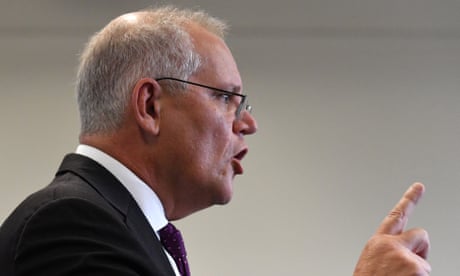- by foxnews
- 23 May 2025
Morrison’s objection to lifting wages in line with inflation puts spotlight on pensions linked to CPI
Morrison’s objection to lifting wages in line with inflation puts spotlight on pensions linked to CPI
- by theguardian
- 13 May 2022
- in news

Economists and advocacy groups have seized on the Morrison government's objection to lifting minimum wages by the inflation rate, noting benefits such as pensions are tied to how consumer prices change.
Prime minister Scott Morrison blasted comments by Labor leader Anthony Albanese on Wednesday that he would "absolutely" support wages keeping pace with prices. That call was "incredibly reckless", Morrison said, adding that wage increases of 5%-plus were "like throwing fuel on the fire of rising interest rates and rising costs of living".
However, student loan repayment costs were this week raised by a formula based on the consumer price index (CPI), while many payments such as pensions are tied to a mix of CPI and cost-of-living changes, economists said.
"It'll be interesting to see which of those the government would want to cut," said John Quiggin, an economics professor at the University of Queensland. "Their position [on opposing inflation indexation] doesn't make sense at all really."
The fuel excise - halved for six months in the March federal budget - is among those indexed to CPI, regardless of international price trends. That temporary cut cost the budget $3bn and trimmed a quarter of a percentage point off the June quarter CPI that the RBA expects to come in at 5.5% by the end of next month.
The ACTU sparked the minimum wages debate when it revised higher its submission to the Fair Work Commission. It called for those of the lowest pay packets to have their $20.33 hourly wage lifted by 5.5% - from a March demand of 5% - for the 2022-23 year to keep up with quickening inflation. The RBA predicts a 5.9% pace by late 2022.
On Thursday, the peak union body claimed Scott Morrison's own $550,000 salary made him the fifth highest-paid leader worldwide. It also noted pay for Australian politicians has increased 30% over the past 10 years, or about 50% more during that time than the RBA's representative "basket of goods and services" had risen in price.
Politicians' salaries are set by an independent tribunal, with inflation taken into account. According to the government's own data, they have increased faster than the average wage particularly after an adjustment a decade ago.
Tim Harcourt, chief economist at the University of Technology Sydney's Institute for Public Policy and Governance, said the sudden focus on wages and inflation was great for labour economists - "these were really sleeper issues".
Harcourt, who was one of the Fair Work Commission's experts from 2013-18, said employers in the past had not objected much to the annual reset of the minimum wage because it helped give them some certainty to base wages on.
"The important principle is that if wages increase at the rate of prices and productivity gains it's basically not inflationary," Harcourt said.
He said the gap between minimum and average wages had widened after 1996, the year the incoming Howard government ended the 13-year Price and Incomes Accord agreement.
Ian Henschke, chief advocate of National Seniors Australia, said pensions being linked to CPI did not address increasing poverty among senior Australians.
According to the lobby group's submission to this year's federal budget, about one-third of the 1.5 million people living solely on the age pension are on or below the poverty line.
The last major adjustment came with the Harmer pension review in 2009, and conditions - particularly for those pensioners who were in rental accommodation - had worsened.
As an illustration of their plight, one 75-year-old woman in Victor Harbor in South Australia recently told Henschke her rent was $340 a week, reduced to $270 after rental assistance. On her remaining pension "she's got $30 a day to live on", he said.
The pension "should be looked at for its inadequacy" not just whether it was tracking CPI, Henschke said. "Pensioners have been completely forgotten [in this campaign]."
- by foxnews
- descember 09, 2016
United Airlines flight returns to Hawaii after concerning message found on bathroom mirror; FBI investigating
United Airlines Flight 1169 to Los Angeles returned to Hawaii after a "potential security concern" aboard the plane. The FBI and police are investigating.
read more


